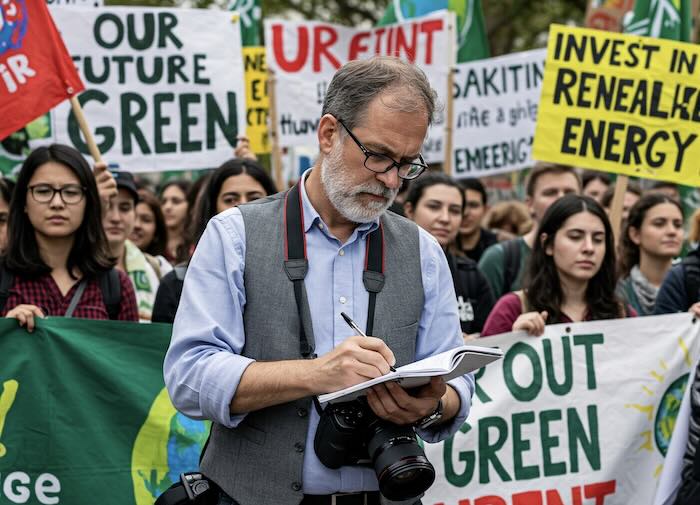
Climate change is a complex and urgent story, demanding careful consideration of tone and language from the journalists covering the issue.
Journalists bear a responsibility for conveying the science, the impacts, alternative views, and the potential solutions of climate change accurately without resorting to alarmism or complacency.
Journalists are not activists. We are committed to impartiality. And we must avoid editorialising when covering news stories. We are exposed to raw emotions, scientific evidence, personal experiences, what we see and hear, what others tell us, and social media post-truth. Here’s a guide to navigating all the elements that make up a story:
Prioritise accuracy and nuance:
- Avoid sensationalism: Exaggerated language can undermine credibility and lead to distrust. Stick to verifiable facts and data. And try to avoid the use of adjectives and adverbs.
- Acknowledge uncertainty: Science is a process of refinement. When dealing with climate projections, differentiate between established consensus and areas of ongoing research. Use phrases such as “scientists project” or “models suggest” to convey appropriate levels of certainty.
- Define technical terms: Climate science is rife with jargon. Explain terms such as “carbon neutrality,” “RCP scenarios,” and “climate feedback loops” in clear, accessible language. See our Climate change glossary.
- Represent diverse perspectives: While scientific consensus on the severity of climate change is overwhelming, acknowledge the existence of differing viewpoints within the scientific community and among policymakers. However, avoid false balance by giving undue weight to fringe theories. See our article False balance and false equivalence.
Reflect reality
- Convey the gravity of the situation: Don’t shy away from reporting on the impacts of climate change, from extreme weather events to sea-level rise.
- Highlight solutions and those working for change: You will cover stories about innovation, resilience, and action, as well as stories about individuals, communities, and organisations working to mitigate and adapt to the effects of climate change.
- Avoid apocalyptic language: Framing the climate crisis as an inevitable apocalypse is taking a subjective stance. Instead focus on the data, what is being done about it, and how people are dealing with the situation.
- Dissenting voices: Journalists need to be aware of dissenting views as to the cause of climate change even if those views are not scientifically proven. Understanding the arguments of climate change deniers helps journalists and the public understand the alternative explanations and leaves the audience with the choice of what to believe. Presenting denier arguments – in appropriate proportion – can create an opportunity for journalists to fact-check the views presented.
Choose language carefully:
- Humanise the story: Focus on the human impacts of climate change, telling the stories of individuals and communities affected by extreme weather events, displacement, and resource scarcity.
- Avoid language that normalises inaction: Phrases such as “business as usual” or “inevitable consequences” can create a sense of complacency or fatalism. Instead, emphasise the efforts of individuals and institutions to effect change.
- Be mindful of the emotional impact of language: Words such as “catastrophe” or “disaster” can be triggering for some audiences. Consider using accurate language that conveys the severity of the situation without causing undue alarm. See our article on the use of adjectives and adverbs in journalism.
- Use respectful language: Avoid terms that could be seen as demeaning to those affected by climate change, especially those from vulnerable communities.
Consider your audience:
- Tailor your language and tone to your audience: A scientific journal will require a different approach than a general-interest news outlet.
- Be mindful of cultural and regional differences: Climate change impacts and responses vary across different regions and cultures.
- Avoid alienating your audience: Use language that is inclusive and accessible to a wide range of readers.
In conclusion, reporting on climate change demands a delicate balance. By prioritising accuracy, and using appropriate language, journalists can play a crucial role in informing the public by spreading understanding.








